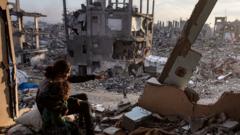Amid a backdrop of political shifts and mixed signals, efforts to secure a lasting ceasefire in Gaza remain fraught with confusion and tension, with key stakeholders emphasizing the crisis's potential repercussions.
**Confusion and Mistrust Over Gaza Ceasefire Efforts Intensify**

**Confusion and Mistrust Over Gaza Ceasefire Efforts Intensify**
Diplomatic efforts to salvage a shaky ceasefire agreement between Israel and Hamas face complications and uncertainties.
The Gaza ceasefire agreement that took effect on January 19 has become increasingly precarious, showing signs that it could completely unravel. Senior Egyptian officials informed the BBC that both Egypt and Qatar are ramping up their diplomatic interventions to preserve the ceasefire, which has been directly threatened by a series of recent developments.
In Cairo, a senior delegation from Hamas has arrived for talks aimed at mitigating the ongoing crisis. A Hamas representative reaffirmed the group's commitment to the current terms of the ceasefire. However, contrasting messages emanated from Israeli leadership. Prime Minister Benjamin Netanyahu clearly stated that if Hamas does not return the remaining 76 hostages by Saturday noon, military operations would resume. The ambiguity regarding the ultimatum, particularly whether it pertains to all hostages or just a segment, adds to the uncertainty.
U.S. President Donald Trump's recent radical proposal to potentially transfer control of Gaza without its two million residents has further complicated the context surrounding the ceasefire. This plan follows Hamas's vocal grievances regarding alleged Israeli violations of ceasefire terms, especially concerning humanitarian aid.
Israeli media have reported on the disarray following a four-hour security cabinet meeting, expressing confusion over the conflicting messages from various Israeli officials about the status of hostages’ potential release. While some statements suggested an expectation of imminent releases, far-right Israeli figures have intensified rhetoric about military responses, indicating a willingness to respond aggressively to perceived failures by Hamas.
Complicating factors arise from the families of hostages and residents of Gaza who are concerned for their loved ones and their own safety, respectively. Since the ceasefire began, 16 Israeli hostages have been released in exchange for hundreds of Palestinian prisoners. Concurrently, many displaced Palestinians have started to return to their neighborhoods, prompting a humanitarian influx.
Despite claims by Hamas that Israel has not lived up to its commitments regarding aid delivery—specifically, the need for temporary shelters—reports indicate that aid is indeed reaching Gaza. As per the UN, 644,000 individuals in Gaza have received assistance since the ceasefire was enacted.
The political scene is equally tumultuous, with Egyptian and Qatari mediators emphasizing the need for all parties to adhere to the ceasefire terms, warning that any collapse could trigger renewed violence throughout the region. Even if the immediate issues are addressed in the coming days, the conversation around extending the ceasefire, planned to expire in March, remains unresolved.
The situation creates an environment of deep mistrust as various factions vie for influence regarding Gaza’s future, particularly in light of Trump’s controversial proposals that have sparked outrage across the Arab world. Egypt has drafted its own plans for Gaza's reconstruction, which do not involve displacing its Palestinian population; regional leaders are expected to convene shortly to address the situation.
As these developments unfold, the confusion and mistrust surrounding the ceasefire only seem to deepen, leaving stakeholders concerned about the potential for escalation in hostilities.
In Cairo, a senior delegation from Hamas has arrived for talks aimed at mitigating the ongoing crisis. A Hamas representative reaffirmed the group's commitment to the current terms of the ceasefire. However, contrasting messages emanated from Israeli leadership. Prime Minister Benjamin Netanyahu clearly stated that if Hamas does not return the remaining 76 hostages by Saturday noon, military operations would resume. The ambiguity regarding the ultimatum, particularly whether it pertains to all hostages or just a segment, adds to the uncertainty.
U.S. President Donald Trump's recent radical proposal to potentially transfer control of Gaza without its two million residents has further complicated the context surrounding the ceasefire. This plan follows Hamas's vocal grievances regarding alleged Israeli violations of ceasefire terms, especially concerning humanitarian aid.
Israeli media have reported on the disarray following a four-hour security cabinet meeting, expressing confusion over the conflicting messages from various Israeli officials about the status of hostages’ potential release. While some statements suggested an expectation of imminent releases, far-right Israeli figures have intensified rhetoric about military responses, indicating a willingness to respond aggressively to perceived failures by Hamas.
Complicating factors arise from the families of hostages and residents of Gaza who are concerned for their loved ones and their own safety, respectively. Since the ceasefire began, 16 Israeli hostages have been released in exchange for hundreds of Palestinian prisoners. Concurrently, many displaced Palestinians have started to return to their neighborhoods, prompting a humanitarian influx.
Despite claims by Hamas that Israel has not lived up to its commitments regarding aid delivery—specifically, the need for temporary shelters—reports indicate that aid is indeed reaching Gaza. As per the UN, 644,000 individuals in Gaza have received assistance since the ceasefire was enacted.
The political scene is equally tumultuous, with Egyptian and Qatari mediators emphasizing the need for all parties to adhere to the ceasefire terms, warning that any collapse could trigger renewed violence throughout the region. Even if the immediate issues are addressed in the coming days, the conversation around extending the ceasefire, planned to expire in March, remains unresolved.
The situation creates an environment of deep mistrust as various factions vie for influence regarding Gaza’s future, particularly in light of Trump’s controversial proposals that have sparked outrage across the Arab world. Egypt has drafted its own plans for Gaza's reconstruction, which do not involve displacing its Palestinian population; regional leaders are expected to convene shortly to address the situation.
As these developments unfold, the confusion and mistrust surrounding the ceasefire only seem to deepen, leaving stakeholders concerned about the potential for escalation in hostilities.





















